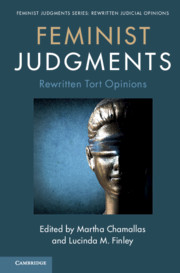Book contents
- feminist judgments: rewritten tort opinions
- Feminist Judgments Series Editors
- Feminist Judgments: Rewritten Tort Opinions
- Copyright page
- Contents
- Notes on Contributors
- Preface
- Table of Cases
- Part I Introduction
- Part II The Classics
- Part III Intentional Torts
- 6 Commentary on Robinson v. Cutchin
- 7 Commentary on Guthrie v. Conroy
- 8 Commentary on Lyman v. Huber
- 9 Commentary on Sipple v. Chronicle Publishing Co.
- Part IV Negligence and Vicarious Liability
- Part V Damages
- Index
9 - Commentary on Sipple v. Chronicle Publishing Co.
from Part III - Intentional Torts
Published online by Cambridge University Press: 28 November 2020
- feminist judgments: rewritten tort opinions
- Feminist Judgments Series Editors
- Feminist Judgments: Rewritten Tort Opinions
- Copyright page
- Contents
- Notes on Contributors
- Preface
- Table of Cases
- Part I Introduction
- Part II The Classics
- Part III Intentional Torts
- 6 Commentary on Robinson v. Cutchin
- 7 Commentary on Guthrie v. Conroy
- 8 Commentary on Lyman v. Huber
- 9 Commentary on Sipple v. Chronicle Publishing Co.
- Part IV Negligence and Vicarious Liability
- Part V Damages
- Index
Summary
Sipple v. Chronicle Publishing Co. denied a right to privacy claim of a man who had been “outed” as gay in newspaper articles that reported on his intervention in thwarting an assassination attempt on the life of President Gerald Ford. The court ruled that Sipple could not prove the elements of the privacy tort of public disclosure of private facts because his sexual orientation had not been kept completely secret from friends and acquaintances in San Francisco, although he has not disclosed his orientation to his family. The feminist rewritten opinion reshapes the right of privacy claim to protect LGBT plaintiffs, arguing that permitting limited disclosure is crucial to give such individuals a measure of control over their most intimate information. The feminist approach takes into account constitutional principles of equality and freedom of association when interpreting the scope of the right to privacy, paying close attention to context and the particular interests at stake. The accompanying commentary paints a portrait of Sipple as an involuntary “gay hero” whose life was upended by publicity and reflects on the limitations of law as a vehicle of liberation.
Keywords
- Type
- Chapter
- Information
- Feminist Judgments: Rewritten Tort Opinions , pp. 194 - 214Publisher: Cambridge University PressPrint publication year: 2020



